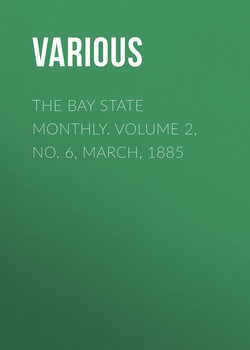Читать книгу The Bay State Monthly. Volume 2, No. 6, March, 1885 - Various - Страница 4
Hon. Rodney Wallace
His Business Life
ОглавлениеIn 1853 Mr. Wallace came to Fitchburg and entered upon that period which, for convenience, I have named his business life. He formed a co-partnership with Stephen Shepley, known as Shepley and Wallace. They were wholesale dealers in books, stationery, paper-stock, and cotton-waste. This firm continued under the name of Shepley and Wallace, and R. Wallace and Co. till July 1, 1865. On this day the firm dissolved, and the business was divided. Mr. Wallace took the department of paper-stock and cotton-waste, which he still carries on. To what proportions it has grown, under his management, may be judged from the fact that the business done amounts at least to $200,000 a year.
December 31, 1864, Stephen Shepley, Benjamin Snow, and Rodney Wallace bought the Lyon Paper Mill and the Kimball Scythe Shops at West Fitchburg, and began the manufacture of paper under the name of the Fitchburg Paper Company, Stephen E. Denton was taken into the firm as a partner soon after. He had charge of the business at the mill. In July, 1865, Rodney Wallace and Benjamin Snow bought the interest of Stephen Shepley; and the Fitchburg Paper Company was then Wallace, Snow, and Denton. Mr. Denton died in June,1868. January 7, 1869, Mr. Wallace bought the interest of Benjamin Snow. January 23 of the same year he bought the interest of Mr. Denton's estate of his widow, who was at that time residing in New York. From that date till the present the Fitchburg Paper Company is Rodney Wallace. He retains the old firm name.
Since becoming sole owner, he has added largely to the original property. A neat village of dwellings has grown up around his mills, which deserves a name of its own. Wallaceville would be an appropriate name. He has put in a substantial stone dam at great expense. In 1878 he erected a new brick mill, with all the modern improvements, doubling the capacity of the establishment. It is now capable of producing from 15,000 to 18,000 pounds of paper every twenty-four hours. Just across the Nashua River is the Fitchburg Railroad. He has a freight station of his own, where he receives all his freight and ships all his paper.
Mr. Wallace has conducted his business with rare sagacity, with unblemished integrity, and with an eye to the welfare of his employees, as well as to his own personal interests. If it were not like praising a man to his face, since he still lives, many instances might be cited to prove that it has not been his policy to get the most out of his employees for the least possible return. But it is enough to say that he has no difficulty in keeping men in his employ. Somehow he has hit upon a plan by which he has kept the irrepressible conflict between capital and labor at a distance.
Aside from his own business, which makes large drafts upon his time, strength, and thought, he has been closely identified with numerous other corporate and monetary interests. He has thus had a large share in contributing to the growth and prosperity of the enterprising city in which he lives. Its business interests, to a large degree, have enjoyed his wisdom, and profited by his sagacity. Since 1864 he has been President and Director of the Fitchburg Gas Company; a Director of Putnam Machine Company since the same year; a Director of the Fitchburg National Bank since 1866; a partner in the Fitchburg Woolen Mills since 1877; a Trustee of Smith College since 1878. He is a Director of the Fitchburg Mutual Fire Insurance Company; a Trustee of the Fitchburg Savings Bank; a Director of the Fitchburg Railroad; a partner of the Parkhill Manufacturing Company. Besides these, he has had the settlement of large and important estates, demanding time, good judgment, and unbending integrity. We would especially note the large estate of the late Ephraim Murdock, Jr., of Winchendon, and that of the late Hon. Wm. H. Vose of Fitchburg. These facts speak for themselves, and show the esteem in which Mr. Wallace is held by his fellow citizens, as a wise counsellor, and as a man of integrity and uprightness of character, as well as of rare good judgment in all matters pertaining to the transaction of business. Another says, "In whatever enterprise Mr. Wallace has been engaged, he has not only been fortunate in its pecuniary interests, but also in the speedy command of the confidence and respect of his associates. True moral principles have been united with unquestioned probity, business tact, and liberal, intelligent management." He has won a large fortune, without parting with his honesty in earning a single dollar. As his property has increased, his generous spirit has seen larger opportunities and at once embraced them. He has not been among those who withhold more than is meet and tend to poverty. Property in such hands is not a grinding monopoly, but a wide blessing. Such men can afford to be wealthy. They represent the true socialistic spirit, which is, that private capital should be held as a public good.
Largely through the influence of Mr. Wallace various improvements have been made in Fitchburg, which contribute to its attractiveness. The business of the city is in no small degree indebted to him for facilities with which communication can be had with the world outside. Prominent mention may be made of the beautiful Union Railway station at Fitchburg in securing whose erection, and in planning which, Mr. Wallace was largely instrumental.
